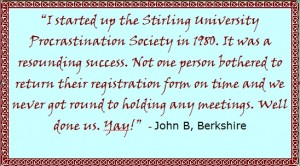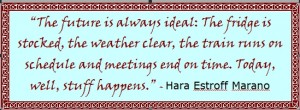Today I was disappointed to find that a quote I had had lurking in my brain for years and years did not come from Mahatma Gandhi.
I was delving around the interweb, looking for information about procrastination. Doesn’t everybody? I don’t remember what started me off, but it occurred to me that almost everyone I have ever known has, to a greater or lesser extent, procrastinated. Even those of us fortunate enough to live a life of semi, or complete retirement seem to have certain things they never get around to doing.
I would understand this universal tendency better, if it made us feel good: after all, as human beings we are disposed to seek the pleasant and avoid the unpleasant. Who in their right mind eschews pavlova and seeks out bran? OK, so someone with an egg allergy might, but you get my drift.
In the days before Wiki, I could have leapt onto my bicycle, pedalled to the library and browsed the reference section for hours, looking for information about procrastination. Of course, I would not have done that until I had written a list of all the socks in my sock drawer, sorted out my cuticles, had a cup of tea and watched some daytime television. Today, thanks to the wonders of technology, I merely made the cup of tea and had a quick look at Face Book, checked my emails, and had a chat with Boggle.
“Procrastination” I typed into the search, wondering what pithy aphorisms would come up. (I just looked up aphorism, to see what that would bring up. “Sits he on ever so high a throne, a man still sits on his bottom.” – Montaigne. Easily distracted? Moi?) I was surprised at the learned articles on the subject that came high on the search engine’s offering. I was less surprised that many of these articles were aimed at helping students, and written by academics, who clearly remembered procrastinating their way through their own undergraduate studies.
So what, according to the experts, is procrastination? By this I mean the experts who research such things, not the experts who have Olympic standard procrastination qualifications and experience. As in all other areas of endeavour, there are those who do and those who talk about doing.
Procrastination, they say, must be counterproductive, needless, and delaying. One attempt to define the word is “to voluntarily delay an intended course of action despite expecting to be worse off for the delay.” I am not entirely sure that is a hundred per cent right. I think it assumes a conscious putting off and a considering of the consequences. Not so in my case: I have honed my skills so thoroughly that I can procrastinate as easily and as unconsciously as breathing.
I was quite enjoying the article I was reading until it progressed from telling me that I was on some level consciously making bad decisions that will cause me grief, to telling me that I was well on the way to stress, a sense of guilt and crisis, severe loss of personal productivity, as well as social disapproval for not meeting responsibilities or commitments. Crikey!! When it went on to suggest that chronic procrastination may be a sign of an underlying psychological disorder, I decided that I should delay no further and seek something less accusatory, and more encouraging in tone. “After all,” I told myself, “I have always worked best under pressure, and it’s amazing how much I can get done when I really need to.”
“Aha!” Crowed the next article on the list. “That’s typical of a procrastinator.” I read on, with growing dismay. It appears that many of us think we can choose to put something off. We are free to do so because we know we can get phenomenal amounts done at the last minute. Apparently, we think this spurt of energy as the deadline roars upon us is a sign that we work well under pressure. Wrong!! In sepulchral tones the article tells me: “Actually, at this point you are making progress only because you haven’t any choice. Your back is against the wall and there are no alternatives. Progress is being made, but you have lost your freedom.” I could almost hear the moustache twiddling and the fiendish, mocking laughter as I moved hastily on to the next source of wisdom.
Mañana, Contingent mañana, Grasshopperism and Escapism are all quite normal, according to my next expert. I was warming to this man until he called me a frustrated victim. In condescending tones he informed me that I could not understand my behaviour, that I was pathetically mystified, and that the reasons for my behaviour were too deep for a pleb such as I to understand. I may have seasoned his actual words with the bitter spice of paranoia, but the fact that I am paranoid does not necessarily mean that he was not taking a pop at me.
I finally found somebody I could identify with, someone who knew his limitations, but had worked out a strategy for living a full and happy life, achieving astonishing amounts while holding on to his procrastinating credentials. He has developed what he calls Structured Procrastination.
The theory goes something like this: procrastination is doing something less important in order to avoid doing something more important. Put another way, procrastinators will do all sorts of ‘marginally useful’ things to avoid doing something really useful. This accounts for why I have an obsessively neat sock drawer, but have yet to sort out a long overdue dental appointment.
So should procrastinators try to shorten their list of things to do in the hope that clearing the wood will help them see the trees? Definitely not! As my, by now, adopted guru says, “If all the procrastinator had left to do was to sharpen some pencils, no force on earth could get him do it…(If he jettisons most of the items on his list, the few left) will be by definition the most important, and the only way to avoid doing them will be to do nothing. This is a way to become a couch potato, not an effective human being.”
I read on hungrily, and now know that in order to be the best human being I can be, I must have a list. (Thank goodness for that: I love lists.) At the top of this list must be something that is important. Genuinely important. It must also be something that will not actually ruin my entire life if I don’t attend to it for an almost indefinite period of time. While I put this one task off, I can tackle everything else of lesser importance. These can still be important things, but I can do them, as long as I have the top item firmly at arm’s length. And when the time comes that I really need to address the thing I am putting off? Simple. I just put something else that is even more important above it on the list. It is so blindingly obvious once you grasp the concept! This is the Columbus’ egg of navigating the world of procrastination.
The fact that this is a cunning exercise in self-deception does not really worry me in the slightest. I have years of experience of self-imposed rules to justify doing ridiculous things. Warped, I know, but if I can kid myself along, I am perfectly happy to do so. To quote my new-found life coach “This is not a problem, because virtually all procrastinators have excellent self-deceptive skills also. And what could be more noble than using one character flaw to offset the bad effects of another?”
I am so enamoured with the whole concept, that I am going to go back to his most excellent website. There I shall buy myself a Structured Procrastination mug and use it for drinking cups of tea while I put off tackling anything unsavoury or boring.
By the way, I have remembered what started my research. I was supposed to be cleaning the bathroom, when the subject of procrastination came to mind. “What a strange and irritating phenomenon procrastination is,” I thought. “I should research it for a blog post, and then I will be able to clean the toilet without the distraction of wondering why I procrastinate so much.”
Oh, and the quote that started this all off? Leave only until tomorrow that which you are willing to die having left undone – Pablo Picasso
P.S. 08/10/12 I just saw a lovely quote on the profile of the wonderful Brian of Greenfields Africa. “Don’t put off till tomorrow what you can reasonably leave to the day after.”



